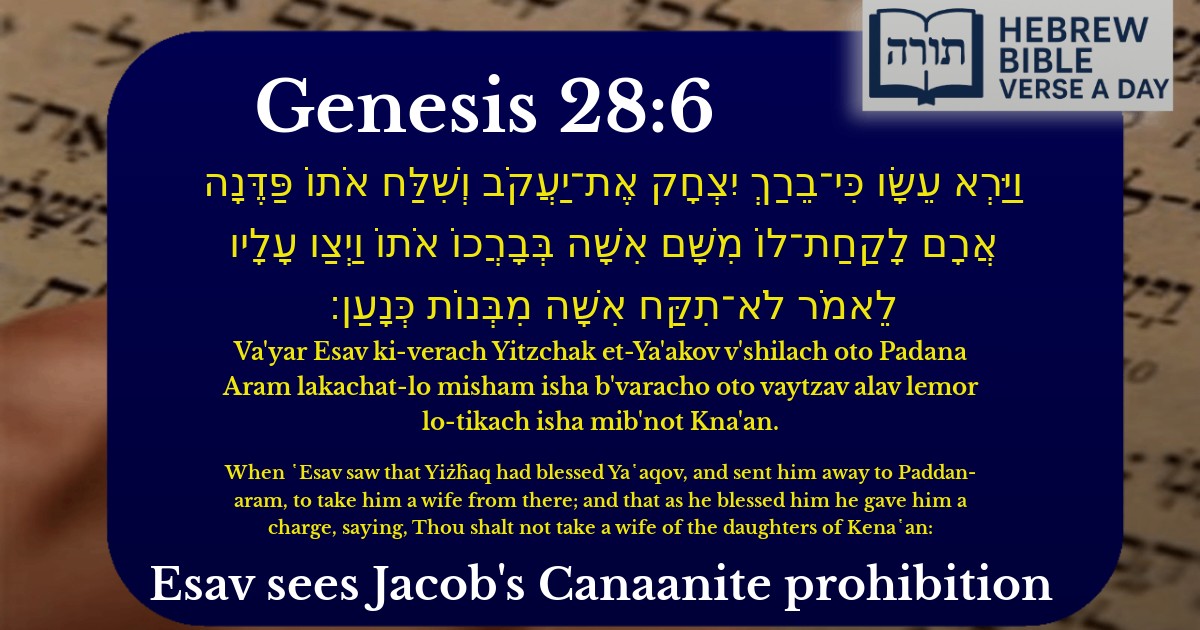Join Our Newsletter To Be Informed When New Videos Are Posted
Join the thousands of fellow Studends who rely on our videos to learn how to read the bible in Hebrew for free!
Hebrew Text
וַיַּרְא עֵשָׂו כִּי־בֵרַךְ יִצְחָק אֶת־יַעֲקֹב וְשִׁלַּח אֹתוֹ פַּדֶּנָה אֲרָם לָקַחַת־לוֹ מִשָּׁם אִשָּׁה בְּבָרֲכוֹ אֹתוֹ וַיְצַו עָלָיו לֵאמֹר לֹא־תִקַּח אִשָּׁה מִבְּנוֹת כְּנָעַן׃
English Translation
When ῾Esav saw that Yiżĥaq had blessed Ya῾aqov, and sent him away to Paddan-aram, to take him a wife from there; and that as he blessed him he gave him a charge, saying, Thou shalt not take a wife of the daughters of Kena῾an:
Transliteration
Va'yar Esav ki-verach Yitzchak et-Ya'akov v'shilach oto Padana Aram lakachat-lo misham isha b'varacho oto vaytzav alav lemor lo-tikach isha mib'not Kna'an.
Hebrew Leining Text
וַיַּ֣רְא עֵשָׂ֗ו כִּֽי־בֵרַ֣ךְ יִצְחָק֮ אֶֽת־יַעֲקֹב֒ וְשִׁלַּ֤ח אֹתוֹ֙ פַּדֶּ֣נָֽה אֲרָ֔ם לָקַֽחַת־ל֥וֹ מִשָּׁ֖ם אִשָּׁ֑ה בְּבָרְכ֣וֹ אֹת֔וֹ וַיְצַ֤ו עָלָיו֙ לֵאמֹ֔ר לֹֽא־תִקַּ֥ח אִשָּׁ֖ה מִבְּנ֥וֹת כְּנָֽעַן׃
וַיַּ֣רְא עֵשָׂ֗ו כִּֽי־בֵרַ֣ךְ יִצְחָק֮ אֶֽת־יַעֲקֹב֒ וְשִׁלַּ֤ח אֹתוֹ֙ פַּדֶּ֣נָֽה אֲרָ֔ם לָקַֽחַת־ל֥וֹ מִשָּׁ֖ם אִשָּׁ֑ה בְּבָרְכ֣וֹ אֹת֔וֹ וַיְצַ֤ו עָלָיו֙ לֵאמֹ֔ר לֹֽא־תִקַּ֥ח אִשָּׁ֖ה מִבְּנ֥וֹת כְּנָֽעַן׃
🎵 Listen to leining
Parasha Commentary
📚 Talmud Citations
This verse is quoted in the Talmud.
📖 Pesachim 119b
The verse is referenced in a discussion about the blessings given to Jacob and Esau, and the implications of these blessings.
📖 Megillah 17a
The verse is mentioned in the context of the narrative of Jacob and Esau, highlighting the significance of Jacob's journey to Paddan-aram.


Understanding Esav's Reaction
The verse states, "When Esav saw that Yitzchak had blessed Yaakov..." (Bereishit 28:6). Rashi explains that Esav observed not only the blessings Yaakov received but also Yitzchak's command for Yaakov to marry a woman from Paddan-Aram rather than the daughters of Canaan. This realization led Esav to recognize the spiritual significance of his father’s instructions.
Yitzchak's Directive to Yaakov
The Torah emphasizes that Yitzchak "sent him away to Paddan-Aram" and commanded him "not to take a wife from the daughters of Canaan." Ramban (Nachmanides) notes that this directive was rooted in the concern that Canaanite women would lead Yaakov and his descendants astray from the ways of Avraham and Yitzchak. The Midrash (Bereishit Rabbah 65:2) further elaborates that Canaanite culture was steeped in immorality and idolatry, making them unsuitable matches for the future bearers of the covenant.
Esav's Misguided Response
Upon seeing Yaakov’s obedience, Esav attempted to rectify his own marital choices. The next verse (Bereishit 28:8) reveals that Esav went to marry Machalat, the daughter of Yishmael. However, the Talmud (Bava Batra 16b) critiques Esav’s actions, explaining that his motivation was not sincere repentance but rather an attempt to appear righteous in his father’s eyes. The Sforno adds that Esav failed to divorce his Canaanite wives, demonstrating that his change was superficial.
Key Lessons from the Verse